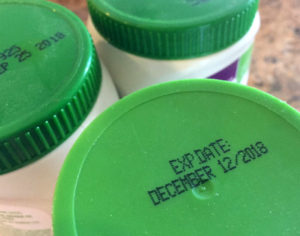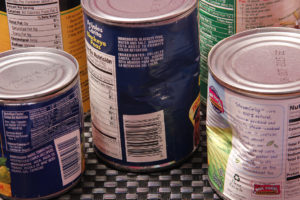 Do you know what food label dates really mean?
Do you know what food label dates really mean?
What do you do when you discover that the date on some of your canned goods has passed?
Confusion over food label dates is a growing problem as consumers have become more aware of food safety. Unsure consumers end up throwing away perfectly good food and squandering their food budget. A study by the Harvard Law and Policy Clinic concluded that nearly 20% of food waste in people’s home is caused by confusing date labels.
Common food label dates
Did you know that dates on most commercially packaged foods are not required, but rather added voluntarily? When a manufacturer chooses to include a date on a food label, it is often to inform consumers that their product will have the best quality if used by the date shown.
- “Best if used by” dates lets the buyer know when the product will have the best taste, texture and appearance. Food can safely be used or donated for a reasonable time past this date unless signs of spoilage are present. Check with your local food bank to see what foods they will accept.
- “Use by” date is the last date recommended for the use of the product while it is still at peak quality. It is not a safety date except for when it is used on infant formula. Federal regulations do require a “Use by” date on infant formula labels.

- “Sell-by” dates as well as “Packaged on” dates tell the store how long to display the product for sale and for inventory management. It is not a safety date.
- Discard foods after the “Expires on” or “Do not use after” date is reached.
Food Safety and Canned Goods
Dented cans may seem like a good deal when they are sold at a discount, but they are not. According to the United States Department of Agriculture (USDA), if a can of food has a small dent, but is otherwise in good shape, the food should be safe to eat. On the other hand, heavily dented cans can be a food safety hazard.
- Why is it dangerous to eat food from a dented can? When a can is dented near a seam, or deeply dented, a pinhole or crack can be created. That small, often invisible opening can allow air to enter. This provides the perfect environment for pathogens to move in and grow. Definitely discard a can if it is bulging or swelling, or if the can sprays or explodes when you break the seal with a can opener. Most food pantries cannot accept heavily dented cans for donation.
- Your canned goods will last longer if they are stored in a cool, clean, dry location and not exposed to extreme temperature swings. Occasionally check the dates on your canned goods and pull the older cans to the front and serve them for your next meal.
Interested in learning more about food product dating and reducing food waste?
- Visit the USDA Food Safety and Inspection Service website on their Food Product Dating page.
- Learn more about safe food storage of perishable foods in CSU Extension’s Food Storage for Safety and Quality fact sheet.



Great explanation.. I hope to reduce my food waste with this information.
I don’t like to waste food. So it really helps to understand the different types of product dates. Growing up many miles from a grocery store, we learned to keep plenty of canned foods on hand in our pantry. I still have this habit, even though I’m just 10 miles from a store. I do try to rotate my canned foods — to use the older products and not store food too long in my pantry.
I’m with you Gisele, we all need to resolve to waste less food.
Great post to help explain a confusing topic